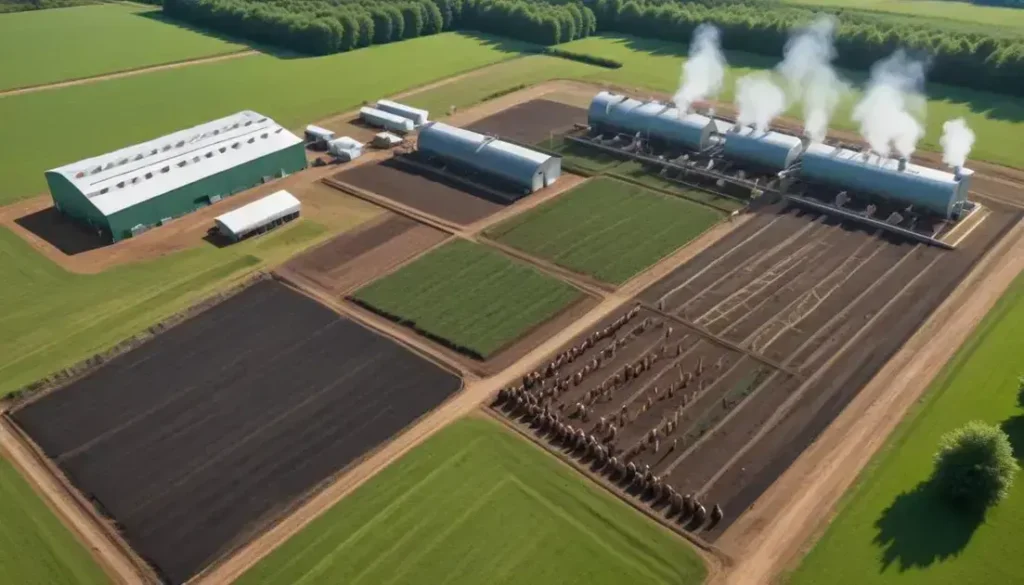Local energy ecosystems are decentralised systems focused on generating and managing renewable energy at the community level, empowering residents to take control of their energy supply while promoting sustainability and reducing reliance on fossil fuels.
The **UK energy transition** is reshaping the landscape of power generation and consumption. Are you ready to explore its implications?
Understanding the UK energy transition
The UK energy transition is a pivotal process reshaping how energy is produced and consumed across the nation. With a growing focus on sustainability, the shift from fossil fuels to renewable energy sources is gaining momentum. This transition is driven by policy changes, technological advances, and public demand for cleaner energy alternatives.
One of the key components of the UK energy transition is the significant investment in renewable technologies, such as wind, solar, and hydropower. The UK has made remarkable progress, particularly in offshore wind farms, which now contribute a substantial portion of the country’s electricity supply. This not only helps to reduce carbon emissions but also promotes energy security.
Furthermore, the Government’s commitment to achieving net-zero emissions by 2050 has led to innovative policies aimed at enhancing energy efficiency across various sectors. Businesses are encouraged to adopt sustainable practices, ensuring they remain competitive in a rapidly changing market.
As the energy landscape evolves, understanding the implications of these changes is crucial for consumers and businesses alike. Staying informed about the UK energy transition can empower individuals and organisations to make better decisions regarding energy consumption and investment.
Capgemini’s role in the energy landscape
Capgemini plays a crucial role in shaping the energy landscape of the UK by providing innovative solutions that drive efficiency and sustainability. As a leading consulting firm, Capgemini leverages cutting-edge technologies to enhance operations within the energy sector, assisting companies in adapting to the demands of the energy transition.
Through advanced data analytics and artificial intelligence, Capgemini helps energy providers optimise their resources. These tools empower businesses to forecast demand accurately, manage energy distribution effectively, and reduce operational costs. This approach not only increases profitability but also aligns with governmental goals for net-zero emissions.
Furthermore, Capgemini is actively involved in collaborative projects that facilitate the integration of renewable energy sources into the existing grid. By fostering partnerships between public and private sectors, they are instrumental in developing sustainable energy solutions that can meet future challenges.
Capgemini’s deep understanding of regulatory frameworks enables them to guide clients through complex compliance landscapes. They provide strategic insights that enhance the competitive advantage of their customers, ensuring that they not only meet current regulations but also stay ahead in the evolving energy market.
Government reforms overview
The UK Government has implemented a series of reforms aimed at transforming the energy sector, transitioning from traditional fossil fuels to more sustainable energy sources. These reforms are designed to enhance efficiency, promote renewable energy, and support the net-zero emissions target by 2050.
One significant reform is the introduction of the Energy White Paper, which outlines the Government’s strategy for a cleaner, greener energy system. This document focuses on investments in renewable technologies, such as wind and solar power, as well as the development of energy storage solutions to manage supply and demand effectively.
Another important aspect is the Contracts for Difference (CfD) scheme, which ensures stable pricing for energy producers by guaranteeing payments through government contracts. This encourages investments in low-carbon energy projects, providing financial security for investors and aiding in the rapid expansion of renewable energy capacity.
The Government also promotes local energy initiatives that empower communities to harness their own energy sources. These initiatives not only enhance energy security but also foster economic growth and job creation in the renewable sector.
By implementing these reforms, the UK Government is paving the way for a more resilient energy future, aligning economic growth with environmental sustainability while addressing the challenges posed by climate change.
Impact on energy pricing
The ongoing shift towards renewable energy is significantly influencing energy pricing in the UK. As the nation embraces a sustainable energy future, market dynamics are adjusting to reflect the new landscape of energy production and consumption.
One key factor in pricing is the increasing reliance on renewable energy sources, such as wind and solar power. These sources have low marginal costs of production, which can lead to lower prices as their share in the energy mix grows. The competition between renewable sources and traditional fossil fuels creates a downward pressure on prices, benefiting consumers.
Moreover, the introduction of mechanisms like the Contracts for Difference (CfD) ensures that renewable energy projects receive stable revenue streams, encouraging further investment. This stability can help mitigate price volatility often seen in fossil fuel markets, resulting in more predictable energy costs for households and businesses.
However, transitioning to green energy can also entail short-term costs, particularly during periods of heavy investment in infrastructure and technology. Consumers may experience fluctuations in pricing as the energy grid adapts to accommodate higher capacities of renewable resources.
Ultimately, while the transition is complex, the focus on sustainability positions the UK for a more resilient and cost-effective energy pricing structure in the future.
Infrastructure upgrades in focus
As the UK embarks on its energy transition, infrastructure upgrades are fundamental to supporting a more sustainable energy system. Investing in modern infrastructure is critical for integrating renewable energy sources into the national grid and ensuring reliability for consumers.
One key area of focus is the enhancement of the electricity grid. Upgrading grid capacity enables the integration of diverse energy sources, such as wind, solar, and hydropower. Smart grid technology is being introduced to improve efficiency and allow for two-way communication between energy producers and consumers.
Additionally, the development of energy storage solutions is vital. These technologies, including batteries and pump storage, enable excess energy generated during peak production times to be stored and used when demand is high, stabilising supply and preventing outages.
The UK Government has also prioritised funding for transmission networks, allowing for better connectivity between regions. This not only supports renewable energy projects but also enhances energy trading capabilities across borders, fostering economic growth.
Investment in infrastructure is essential to achieve a resilient energy future. Upgrades not only improve efficiency and reliability but also help to reduce carbon emissions, aligning with the UK’s commitment to reach net-zero by 2050.
Benefits for UK consumers
The transition to renewable energy in the UK brings numerous benefits for consumers. As the energy system evolves, households and businesses can expect significant improvements in both cost and reliability of energy supply.
One immediate benefit is the potential for lower energy bills. Renewables have become increasingly cost-effective, reducing dependency on expensive fossil fuels. As more wind, solar, and hydroelectric plants come online, consumers may see a decline in energy prices over time, making energy more affordable.
Additionally, the shift to sustainable energy sources enhances energy security. By diversifying the energy mix, the UK can reduce its reliance on imported fossil fuels, which are often subject to price volatility and geopolitical tensions. A more resilient energy system means fewer disruptions in supply, ensuring that consumers have access to energy when they need it.
Consumers will also benefit from environmental initiatives tied to the energy transition. As the UK aims for net-zero emissions by 2050, cleaner energy sources contribute to improved air quality and a healthier environment. This not only enhances public health but also aligns with the growing consumer demand for sustainable products and practices.
Lastly, the transition is expected to drive job creation in the renewable sector, further bolstering the economy. As new industries develop, consumers stand to gain from increased employment opportunities in their communities.
Consumer support initiatives
Consumer support initiatives play a vital role in facilitating the transition to renewable energy in the UK. These programmes are designed to educate and assist consumers in adapting to new energy practices and technologies, ensuring a smoother transition towards sustainability.
One significant initiative is the Energy Company Obligation (ECO), which mandates energy suppliers to help low-income households improve energy efficiency. This scheme offers measures such as free insulation and heating upgrades, reducing energy bills and enhancing comfort.
Another essential programme is the Green Homes Grant, which provides funding for homeowners to make energy-efficient improvements. This initiative encourages investments in renewable technologies, such as solar panels and heat pumps. By offering financial support, the government aims to make green upgrades more accessible.
Furthermore, information campaigns are crucial in raising awareness about the benefits of renewable energy and energy efficiency. These campaigns often provide resources that help consumers understand how they can reduce their carbon footprint while saving on energy costs.
In addition, local community energy projects empower residents to generate and manage their own renewable energy. These initiatives foster community engagement and build a sense of ownership over local energy resources. By participating in such projects, consumers become active contributors to a sustainable future.
Strategic planning for the future
Strategic planning for the future is vital for navigating the complexities of the UK’s energy transition. As the country pivots towards renewable energy, businesses and policymakers must develop comprehensive strategies to ensure a sustainable and resilient energy landscape.
One key aspect of this planning involves assessing future energy demands. By forecasting trends in consumption, stakeholders can better allocate resources and plan for necessary infrastructure upgrades. Understanding how shifts in consumer behaviour affect energy usage will help businesses make informed decisions about energy generation and management.
Additionally, adopting technology and innovation is crucial. Integrating smart grid technologies allows for more efficient energy distribution and enhances the ability to manage renewable energy sources. Companies should invest in research and development to stay ahead of the curve and leverage advancements that can improve energy efficiency.
Collaboration is also essential in strategic planning. By engaging with governmental bodies, industry leaders, and local communities, organisations can create synergistic partnerships that foster shared goals in sustainability. This collective approach enables stakeholders to address challenges systematically while maximising the benefits of the energy transition.
Ultimately, a proactive and flexible strategic plan will position UK businesses to thrive in a more sustainable energy future, ensuring they can adapt to regulatory changes and market developments effectively.
AI in energy management
Artificial Intelligence (AI) is revolutionising the way organisations manage energy consumption and production. By leveraging advanced algorithms and data analytics, AI facilitates more efficient energy management strategies that are essential for the transition to sustainable practices.
One significant application of AI in energy management is predictive analytics. This involves analysing historical data to forecast future energy needs, allowing companies to optimise their energy procurement and usage. By accurately predicting demand, organisations can adjust their operations to minimise costs and reduce waste.
Moreover, AI enhances the performance of smart grids. These intelligent networks use AI to monitor energy flows in real-time, enabling better integration of renewable energy sources. By intelligently managing the distribution of electricity, AI helps maintain grid stability and efficiency, while also facilitating the use of greener energy.
AI also plays a vital role in energy efficiency measures. Through machine learning, systems can learn and adapt to user behaviours, making recommendations for improving energy usage in buildings and industrial processes. This not only lowers energy bills for consumers but also reduces the overall environmental footprint.
Overall, the adoption of AI in energy management represents a transformative step towards sustainability, helping organisations optimise their resources while contributing to the UK’s net-zero targets.
Skills training for the energy sector
Skills training for the energy sector is essential in preparing the workforce for the transition to renewable energy. As the industry evolves, there is a growing demand for professionals equipped with the knowledge and skills needed to implement sustainable practices effectively.
One key area of focus is renewable energy technologies. Training programmes are being developed to enhance understanding of solar, wind, and hydro power systems. These programmes help workers develop technical skills necessary for installation, maintenance, and operation of renewable energy resources.
Additionally, energy efficiency training is crucial. Professionals need to comprehend how to identify energy-saving opportunities within buildings and industrial processes. Training in energy management systems enables employees to implement strategies that reduce waste and optimise energy use.
Moreover, soft skills, such as project management and communication, are increasingly important in the energy sector. Effective collaboration among stakeholders is vital for successful project implementation. By prioritising both technical and soft skills development, the energy sector can ensure a well-rounded workforce ready to tackle emerging challenges.
Investment in skills training not only supports individual career development but also contributes to the overall success of the UK’s energy transition. Well-trained professionals help drive innovation and efficiency, paving the way for a sustainable energy future.
Cybersecurity and energy resilience
Cybersecurity is an increasingly critical aspect of the energy sector as it transitions to more digitalised and interconnected systems. As renewable energy sources and smart grids become prevalent, the need for robust cybersecurity measures to protect sensitive data and infrastructure is paramount.
Energy companies must implement defensive strategies to safeguard against cyber threats. This includes regularly updating software systems and installing security protocols to monitor and detect potential breaches. By prioritising these measures, firms can protect their operational technology and prevent disruptions that could affect supply and demand.
Moreover, resilience is vital in ensuring that energy systems can withstand cyberattacks. This involves developing comprehensive incident response plans to minimise impacts in the event of a breach. These plans should include clear communication strategies and allocation of roles and responsibilities to ensure rapid recovery.
Collaboration with government agencies and cybersecurity experts is essential for sharing knowledge and improving defence mechanisms. Through partnerships, the energy sector can strengthen its collective response to cyber threats and enhance protections for critical infrastructure.
In conclusion, addressing cybersecurity in the energy sector is not merely a technical challenge; it is essential for maintaining the trust of consumers and ensuring the stability of the energy supply in an increasingly digital age.
Local energy ecosystems
Local energy ecosystems are emerging as a vital component in the transition to a sustainable energy future. These ecosystems consist of decentralised energy systems that generate, manage, and distribute energy at a local level, enabling communities to harness renewable energy sources effectively.
One key feature of local energy ecosystems is the integration of renewable technologies, such as solar panels, wind turbines, and energy storage solutions. By generating energy locally, communities can reduce their reliance on centralized fossil fuel systems. This not only lowers carbon emissions but also enhances energy security.
Moreover, local energy ecosystems promote community engagement and participation. Residents can take an active role in managing their energy consumption, leading to a greater sense of ownership and responsibility. Community energy projects often bring people together, fostering collaboration and innovation in energy management.
Additionally, these ecosystems can help to stabilise energy prices. By producing and consuming energy locally, communities can shield themselves from fluctuations in energy markets. This predictability benefits residents and local businesses, making energy more affordable.
In conclusion, local energy ecosystems create opportunities for sustainable energy production and consumption, addressing both environmental and economic challenges while empowering communities in their energy journeys.
In conclusion, the future of energy is local and sustainable
As we move towards a greener future, local energy ecosystems play a crucial role in reshaping how we produce and consume energy. By harnessing renewable resources at a community level, we can reduce reliance on fossil fuels and enhance energy security.
These ecosystems empower communities, allowing them to take control of their energy needs while fostering collaboration and innovation. With the integration of renewable technologies, local energy systems can stabilise energy prices and provide a reliable supply.
Furthermore, focusing on skills training and cybersecurity ensures that the workforce is prepared for the evolving energy landscape. Embracing these changes will not only support individual communities but also contribute to national sustainability goals.
Ultimately, the transition to local energy ecosystems offers a pathway to a more resilient, affordable, and environmentally-friendly energy future for everyone.
Common Questions about Local Energy Ecosystems
What are local energy ecosystems?
Local energy ecosystems are decentralised systems that generate, manage, and distribute energy at a community level using renewable resources.
How do local energy ecosystems benefit the environment?
They reduce reliance on fossil fuels, lower carbon emissions, and promote the use of clean energy sources, contributing to a healthier planet.
Can communities really control their own energy supply?
Yes, local energy ecosystems empower communities to produce and consume their own energy, allowing for greater control over their energy needs.
What role does community engagement play in local energy ecosystems?
Community engagement fosters collaboration, innovation, and a sense of ownership, making energy management more effective and sustainable.
How can I get involved in my local energy ecosystem?
You can participate by joining local energy projects, attending community meetings, or advocating for renewable energy initiatives in your area.
What skills are needed for a workforce in local energy ecosystems?
Key skills include technical knowledge of renewable technologies, energy management, project management, and an understanding of cybersecurity measures.


